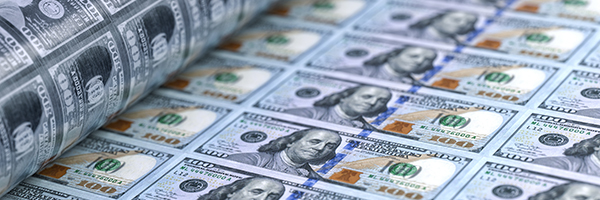Morning Briefing

January 27, 2023 | Daily JAM, Morning Briefing |
Consumer spending, the bulwark of the economy and the reason we had the very positive (2.9%) year-over-year GDP growth rate in the fourth quarter that was announced yesterday, fell by 0.2% in December from November, the Commerce Department reported today, Friday, January 27. After adjusting for inflation, consumer spending fell 0.3% in the month. Today’s report also adjusted the November figures to show a small drop in consumer spending for November. The initial report for that month showed a slight increase.

January 26, 2023 | Daily JAM, Morning Briefing |
The U.S. economy grew at a 2.9% annual rate in the December quarter of 2022. That brought growth for 2022 as a whole to 2.1%. Consumer spending was strong enough to offset slowdowns in housing and manufacturing. So good news. But growth in the quarter was still slower than the 3.2% growth rate in the third quarter

January 25, 2023 | Daily JAM, Jubak Picks, Morning Briefing, MSFT, Top 50 Stocks |
Yesterday, shares of Microsoft (MSFT) rose by more than 4.6% on an earnings report for the December quarter that showed the company slightly beating analyst estimates on earnings and training only slightly on revenue. Today, investors and traders had second thoughts. The stock was down as much as 4.6% in morning trading (That’s down from the close yesterday and not from the after-hours price.) The stock ended the day down just 059% but that was enough to erase all the after-hours gains from the previous day. So what caused the second thoughts?

January 23, 2023 | Daily JAM, Morning Briefing |
In the week leading up to the Lunar New Year festival, the official count for the number of Covid deaths in China after the chaotic end of the country’s 0-Covid policy was 12,658. That brought the total reported by China’s Center for Disease Control and Prevention to an official 59,938. Outside experts calculate that the true total is much, much higher. Airfinity, a healthcare data crunch puts the number at 640,000.

January 20, 2023 | Daily JAM, Morning Briefing |
This may seem perplexing: Alphabet (AKA Google) announced that it would cut 12,000 jobs just days after Microsoft (MSFT) said it would cut 10,000 jobs. And stocks, especially technology stocks, rallied. The Standard & Poor’s 500 closed up 1.89% today and the Dow Jones Industrial Average ended the day up an even 1.00%. The technology-heavy NASDAQ Composite finished up 2.66% and the NASDAQ 100 wound up climbing 2.86%. But remember that the economy doesn’t equal the stock market

January 19, 2023 | Daily JAM, Morning Briefing |
The first steps of an effort that Treasury Secretary Janet Yellen has told Congress could postpone a debt ceiling crisis and a potential government default until June or so fell into place today. The Treasury is deferring payments into two government-run retirement funds to cut outlays and to do an end run about the debt limit accounting rules.

January 18, 2023 | Daily JAM, Morning Briefing |
U.S. retail sales fell 1.1% in December from November, the Department of Commerce reported this morning. Commerce also revised November sales figures to show a drop of 1% from October instead of the originally reported 0.6% decline. The figures are seasonally adjusted (which always introduces an element of uncertainty) but they don’t reflect price changes and some of the month-to-month drop could be a result of declining inflation. The decline might be a reflection of a falling inflation rate in November and December. Could be. Or maybe consumers are cutting back on spending as they anticipate a slowing economy or as they read about another big tech industry layoff.

January 13, 2023 | Daily JAM, Morning Briefing |
The Biden administration will act starting on January 19 to reprioritize federal funds in order to put off a debt ceiling crisis until June, Treasury Secretary Janet Yellin told Congress in a letter today. The “extraordinary measures” which should be old hat at Treasury by now from past crises, are intended to prevent the U.S. government from breaching the debt ceiling until, at least, early June. That would, theoretically, give Congress time to pass legislation raising or suspending the country’s borrowing cap past its current level of $31.4 trillion. Otherwise, the U.S. government would experience a historic default, which Yellen said could cause “irreparable harm to the U.S. economy, the livelihoods of all Americans, and global financial stability.” Theoretically

January 12, 2023 | Daily JAM, Morning Briefing |
Inflation, measured by the headline CPI (Consumer Price Index) fell 0.1% in December versus November. That brought the annual headline inflation rate to 6.5%. That was exactly what a consensus of economists was looking for. The core DPI, which strips out more volatile food and energy prices, rose by 0.3% in December from November. That brought the annual core inflation rate to 5.7%. Again, exactly what economists had forecast. (Remember, the inflation rate peaked at 9.1% this summer.) The stock market didn’t know quite what to do with this inflation reading, however.

January 11, 2023 | Daily JAM, Morning Briefing |
Let’s be honest, everybody from the experts down to you at your home computer is flying blind right now. Trends are so event dependent that I’m not sure there actually is a trend that’s worth buying into for more than a day or two. This will all resolve itself one day–I’d estimate by the middle of 2023–but until then my advice is to NOT get caught up in any of the waves of conflicting short-term sentiment rolling through the market.

January 10, 2023 | Daily JAM, Morning Briefing |
Despite comments from the head of the Atlanta and San Francisco Federal Reserve Banks that peak interest rates may need to go above 5%; despite comments from Federal Reserve chair Jerome Powell that fighting inflation may require unpopular interest rate moves; and even despite comments from JPMorgan Chase CEO Jamie Dimon that there’s a 50% chance that the peak rate may need to climb above 6%, the financial markets are clinging to a belief that interest rate increases will top out at no higher than 5%.

January 8, 2023 | Daily JAM, Morning Briefing |
On Thursday, before the New York market opens, the Bureau of Labor Statistics will report CPI inflation for December. This report will be the last before the Federal Reserve meets to set interest rates on February 1. The Fed already knows what the report says about inflation, but financial markets will react as if this new CPI inflation data will make the difference between a 50 basis-point increase (in line with the 50 basis-point increase on December 14) or will see the central bank send a positive signal on inflation and interest rates by slowing to a 25 basis-point increase. Right now the CME FedWatch Tool says the Fed Funds market is pricing in 86.6% odds of a 25- basis -point move and just 23.4% odds of a 50-basis-point increase.












